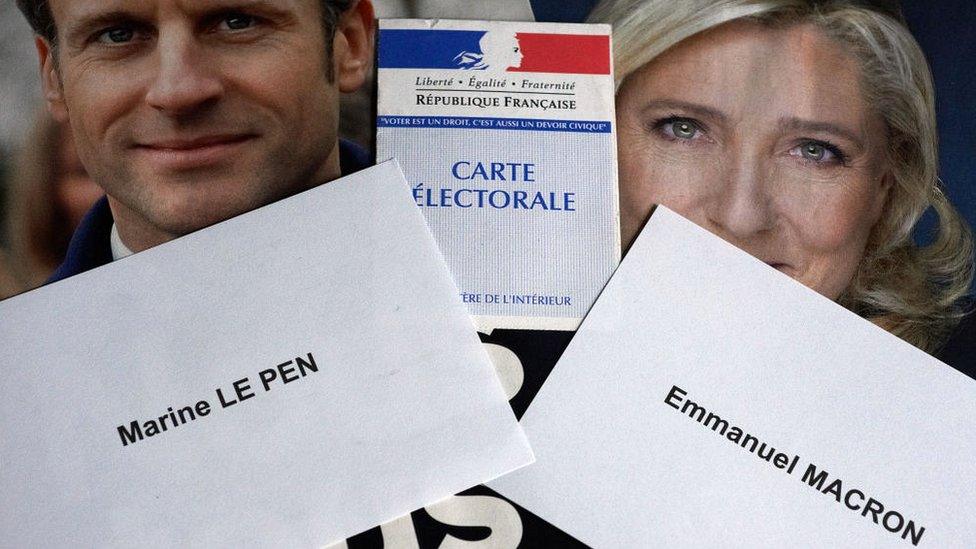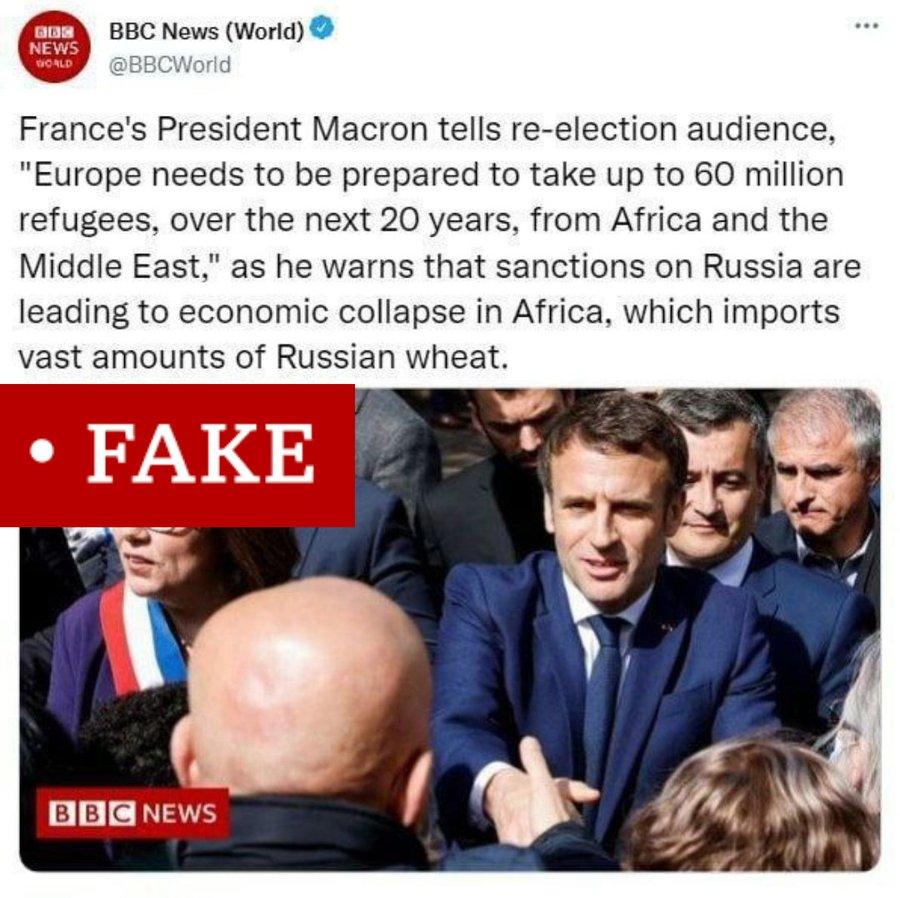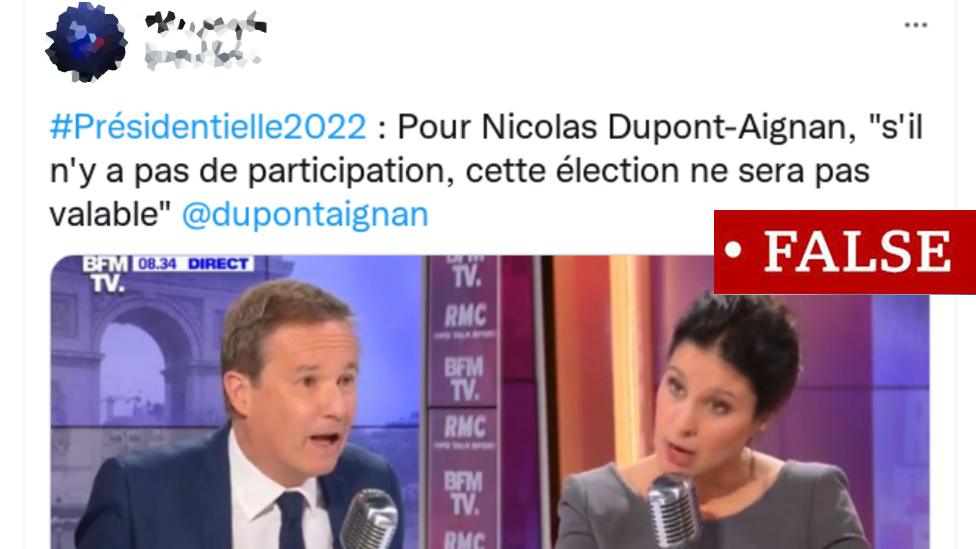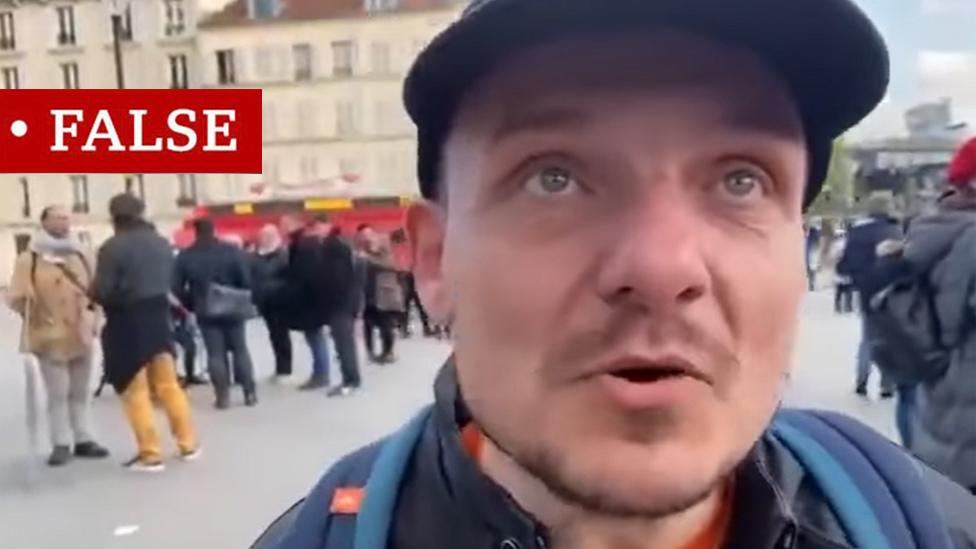French election: Misinformation targets candidates and voting system
- Published

France chooses a new president on Sunday, in a run-off between incumbent Emmanuel Macron and far-right challenger Marine Le Pen.
The French authorities announced measures last year to tackle misinformation aimed at "undermining the state."
But misleading claims have been spreading during the campaign, aimed at both the candidates and the election process itself.
The doctored tweet about migration
An image of a Twitter post about migration to France - falsely attributed to BBC News - has been widely shared on Twitter and other platforms, including pro-Russian channels on Telegram.

In it, President Macron is reported as saying that Europe should be prepared for mass immigration from Africa and the Middle East, as sanctions against Russia are causing economic collapse in Africa.
Supporters of opposition candidates presented it as "proof" that Macron was preparing France to accept mass immigration.
But the doctored image, which is made to look like it's from a BBC account, is fake.
The BBC has confirmed that no such social media post or article exists. And President Macron's campaign team have made clear that he has not made these remarks, external.
Voting machines are not being used to help Macron
False claims have been spread online, largely from right-wing social media accounts, saying that voting machines are being used to help ensure a Macron victory.
It echoes the 2019 US election, when unfounded claims were made that voting machines were used to help Joe Biden beat Donald Trump.
The rumour comes from French followers of the QAnon movement, according to French newspaper Liberation.
The French Interior Ministry has said that the Canadian company named in the claims has no connection to the French elections. The government uses its own computer systems to count votes, the ministry said.
Some constituencies have used electronic voting machines, but their number is extremely small. The vast majority of voting takes place in person, using paper ballots.
Further claims said the voting machines tactic was trialled in the 2017 election, to give Mr Macron an advantage. But an analysis by television channel TF1 showed no single candidate benefited from their use. , external
The election can't be invalidated by a low turnout
Misleading information on social media suggests the election could be invalidated if not enough registered voters cast their ballots.

The incorrect claim picked up traction after an interview on French TV by presidential candidate Nicolas Dupont-Aignan, who said that if 30% of registered voters failed to cast their vote, the election will be invalidated.
"If there is no participation, this election will not be valid," he told BFM TV. He had a more nuanced point - and went on to say low turn-out would only make the election invalid "in people's hearts". However, this was not included when his original comments were shared.
There is no valid reason to invalidate the election result if not enough people vote. Under French law, registering to vote is compulsory, but actually casting a vote is not.
The French constitution sets no minimum turn-out and says "the President of the Republic is elected by an absolute majority of the votes cast".
The turn-out for the first round was 73.69%.
A Paris terror attack suspect is not supporting Macron
Salah Abdeslam is currently on trial in France, for his role in the 2015 attacks in Paris, in which 130 people were killed. He has already been convicted for his part in a terrorist shoot-out in Belgium in 2016.

One Twitter account, which identifies in its bio as a "Russian troll", said that Abdeslam "in tears at his trial" urged voters to "not to commit the irreparable by voting for Le Pen" in the second round of voting.
Amplified by anti-establishment journalists and celebrities, this claim was shared hundreds of times.
Liberation newspaper contacted one of Abdeslam's defence lawyers Olivia Ronen, who confirmed that "at no time did Salah Abdeslam call [on the electorate] to vote for Emmanuel Macron or block Marine Le Pen".
Journalist Chloé Pilorget-Rezzouk, who has been covering the trial for Liberation, said the defendant did not address the issue of the election.
Have yellow vest supporters been banned from voting?
A video by an activist in the anti-establishment Gilets Jaunes (Yellow Vest) movement claims some 22,500 of its members have lost their right to vote.

The video first appeared on Telegram, before spreading to Facebook and Twitter.
In the clip, Gregory Pasqueille claims that "a Macron law" has barred 22,552 Gilets Jaunes "prisoners" from voting for five years. Mr Pasqueille told AFP that he stands by his statements, external, and that he is one of those barred from voting. AFP said he provided no evidence for his claims.
French law has provisions to remove voting rights from some criminals.
Figures from the French justice ministry show the power was applied about 4,000 times across all criminal cases during the years the Yellow Vest protests were at their height - in 2018 and 2019.
The ministry says about 3,900 people were convicted of Yellow Vest-linked offences at that time, making the 22,500 claim extremely unlikely.
